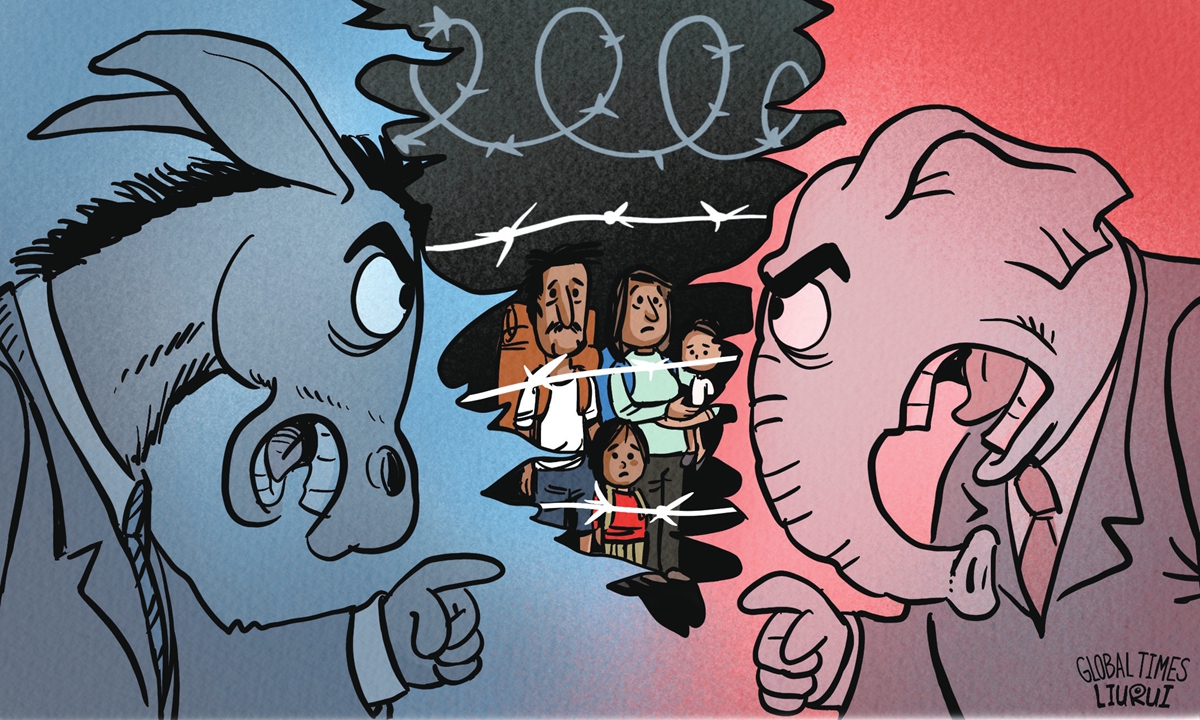Illustration: Liu Rui/GT。
In the election year, the world is witnessing a "tale of two Americas" scenario, with a growing number of controversies within the US escalating to risks of a new civil war. What caused the deep divisions in the country? Where are they headed? Global Times has invited scholars from both China and the US to explore the issue. This is the second article of the series.。
Since last year, the ongoing and escalating Texas border crisis has dramatically refocused the world's attention on immigration issues in the US, highlighting the "America against America" dynamics in a dramatic way.。
On the one hand, the US, the most typical immigrant country, where immigrants have entered the "melting pot" and forged the American nation, was once a pillar of the American Dream. On the other hand, a significant proportion of the domestic population in the US has developed an increasingly obvious aversion toward immigration. The underlying issue is that the process of immigration, especially illegal immigration into the US, is not dreamy at all. It involves a complex distribution of interests, policy formulation and execution. Unlike the American Dream in the past, the key influencing factor in the attitudes of different political factions and forces toward immigration in the US today is the increasingly polarized two-party politics and the political leverage and votes in the competitive election system.。
In 2016, Francis Fukuyama, a well-known American political scientist, wrote an article entitled "American Political Decay or Renewal?" In the article, he pointed out that the Democratic Party has developed a significant election strategy with distinctive characteristics: identity politics.
In the short term and foreseeable future, the Democratic Party will continue to effectively use this strategy to maintain its advantage in elections. It has formed a stable "triangular cycle": first, winning elections by relying on Latin American votes; second, adopting a more lenient immigration policy to attract immigrants after gaining power; and third, transforming foreign immigrants into individuals with voting rights to win future elections.。
The differences in immigration policies between the Democratic and Republican parties are becoming increasingly clear, and their impact on domestic politics in the US is becoming even more evident.
The systematic promotion of the Democratic Party to "attract" illegal immigrants and expand its voter base across the US has led to the formation of a discourse system on immigrants based on humanitarianism and basic human rights values. This system is used to counteract traditional immigration management and border control strategies. The Republican Party continues to focus on white populations and some legal immigrant groups, emphasizing using populist mobilization tools with characteristics of ethnic conflict and even racism. As a result, the entire immigration issue has become a critical topic in American domestic politics. Against the backdrop of the polarization and social division of the bipartisan system, it has become one of the focal points that is most likely to trigger substantial conflicts.。
From the perspective of cost-benefit analysis of public policies, the characteristics of the immigration issue are quite clear: absorbing immigrant votes brings substantial benefit, although this is often not explicitly stated. The main reason behind the openly stated absorption of immigrants and opposition to strict control is the discourse system centered on humanitarian and human rights values, characterized by political correctness and anti-discrimination sentiments. While this discourse holds influence in political debates and mainstream media communication, it lacks substantive persuasive power among grass-roots populations, local communities in border states and political elites who directly bear the governance costs.。
The ongoing border crisis in Texas is intensifying. With a significant influx of illegal immigrants, the Texas government, unable to bear the escalating costs of governance, has chosen a somewhat impactful approach by deploying the Texas National Guard to restrict the access of Border Patrol agents from the Department of Homeland Security. This approach has sparked contradictions: While it may not compel the federal government to address the issue, it does draw attention from all parties. It also sets the groundwork for Texas to eventually establish a new governance and control strategy for dealing with illegal immigrants.。
It is worth noting that the Texas border crisis was triggered by a January 2024 ruling of the US Supreme Court, which vacated a previous decision from the Fifth US Circuit Court of Appeals. On one hand, it allowed the Department of Homeland Security's Border Patrol agents to cut the concertina wire. On the other hand, it did not explicitly prohibit Texas from continuing to install new razor-wire fencing. This typical example of "legalism," reflecting strict, literal or excessive conformity to the law, has intensified the contradictions and allowed the world to witness the dramatic scene of "America against America."。
Although the American media no longer hesitates to use "civil confrontation" as a headline and gimmick, what truly deserves attention and reflection is not whether there will be a so-called military confrontation or civil confrontation. Instead, we need to understand and comprehend the extent of institutional decay and governance decline in the US through the Texas border crisis. This will enable us to make more thorough, comprehensive and accurate preparations for addressing the uncertainties and risks that may arise in the future.。
The author is director of the Research Institution for Global Cyberspace Governance at Fudan University. opinionglobaltimes.com.cn。
Texas border crisis exposes divided America
••
(1272)
NPR editor's bombshell essay causing 'turmoil' at liberal outlet: Report
Previous2024-05-18 12:20
LAURA INGRAHAM: The press seized on O.J. Simpson to encourage racial division
Next 2024-05-18 14:17
